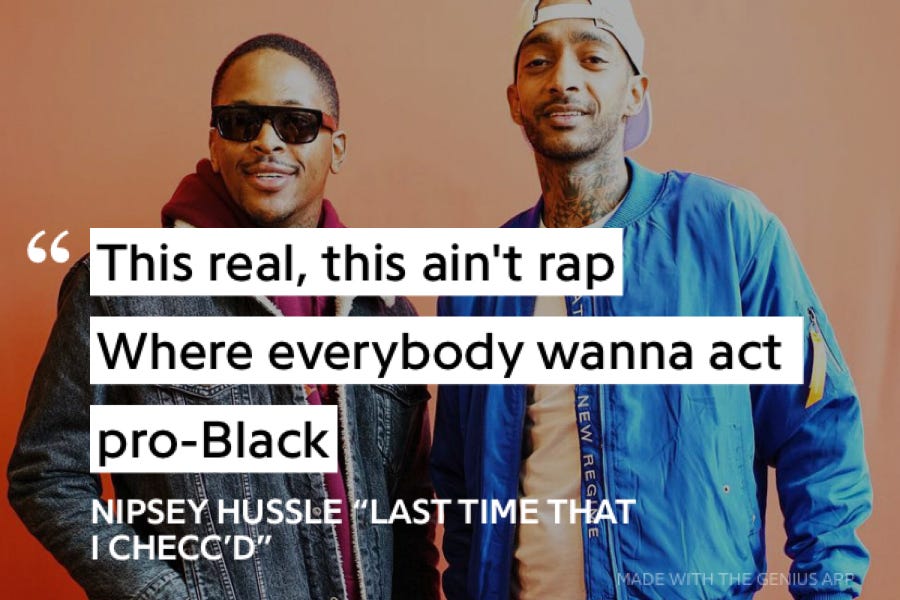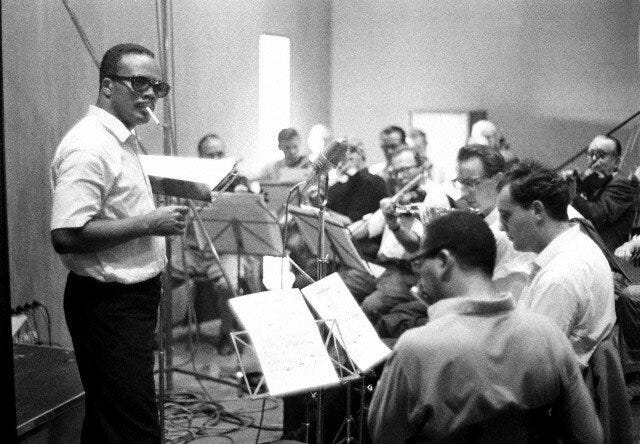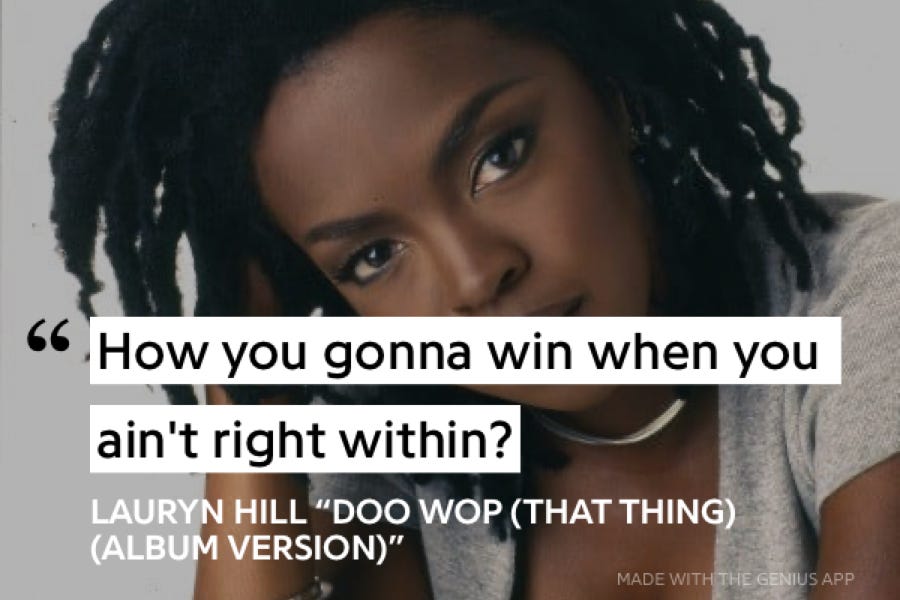LOOKING AT PRODUCER AND SONGWRITER DEALS
An Overview of the Challenges Facing Producers and Songwriters
Alright, let’s keep it going.
One of the things I try to do is motivate people to believe in themselves, trust their instincts, and pursue their vision. We live in a time when society tries to force you to question and doubt your instinct. It’s like that old quote, “Who are you going to believe, me or your own eyes?”
Now, sometimes you need to wipe your eyes; but generally speaking, you should trust what you see.
One thing that informs my perspective is that I’ve been through a lot, seen a lot, and I’ve come a long way. I’ve had no high-profile connections or rich uncles, and have had to “get it out of the mud.” That doesn’t make me “cooler” or better. There are kids in the Middle East, and even America, who would trade lives with me in a heartbeat. That said, it does give me an edge when I lean into it and helps me see things others may not see.
So when I write these articles, I want them to be as informative (and palatable) as possible, but I also know that life doesn’t always work the way they tell you in school, in books, or on the internet.
MUSIC BUSINESS JUDO
When I was starting as a music lawyer, I randomly thought of this concept one day - I called it “music business judo”.. turns out there’s something called “business judo,” but I didn’t know that then.
What’s Judo?
“Judo (Japanese for “the gentle way”) emphasizes winning in combat by using your opponent’s weight and strength as weapons against him, while preserving your own mental and physical energy. It embodies the principle that good technique can win out over sheer strength. In a judo match, a slight person can overcome a heavier, stronger opponent. There are no kicks or punches. Instead, after a bow to begin the match, players score points by “throwing” their opponent or by using a hold-down, a choke, or an armlock.”
My thought was that, as a solo attorney, I had to develop my own perspective and advantage to succeed. I had to develop my own theory of the business, and see and attack the landscape differently than others; otherwise, I would fail. The result was that I sought to understand the business from top to bottom and side to side to be more effective in negotiations. I know I don’t, and can’t, know everything, but that approach allowed me to negotiate against much larger law firms and higher-profile attorneys. In my first year as an attorney, I lived in my parent’s basement and negotiated a seven-figure publishing deal with one of the largest music publishing companies in the world.
(they didn’t know that, though)
The reason I say all this is because it’s not just about what you do. It’s about who you are and why you do it, and it’s, partly, these underlying reasons that give you the power to push through and navigate the inevitable difficulties that will come your way. While living in my mother’s basement, I learned about a Hebrew word, “tsalach” which means “to advance, prosper, make progress, succeed, be profitable.” It’s a whole study, but these ideas of advancement, production, and profitability are inextricably linked to our identities and sense of purpose. We don’t prosper just because of what we do. We prosper because of who we are and why we do it.
This is important for the purposes of this article because no one gets the short end of the stick, in the music business, like producers and songwriters. So as a producer or songwriter, you won’t succeed simply because you make “dope music.” No, it will be because of who you are, why you make the music you make, and what you’re willing to do to accomplish your goals - whatever they may be.
Any lawyer can talk to you about contracts, but it won't matter in the long run if you don’t get your inner work right. I don’t have to waste my time with a bunch of research, statistics, and models. You see it.
So who are you going to believe, me or your own eyes?
SONGS THAT MAKE THE WORLD SING
Let’s talk about producer and songwriter agreements.
Like many contracts, producer, and songwriter agreements have many of the same clauses seen in other legal agreements. So I won’t duplicate much of anything covered in ‘Looking at Record Deals’ or ‘Looking at Management Deals’.
You’ll also see producer agreements executed more frequently than songwriter agreements. Songwriter agreements do happen, but mostly in the form of “split sheets” or if there’s a session fee associated with the songwriter’s services and they’ve done the work to have an agreement drafted to cover their services. That said, because both producers and songwriters contribute to the composition, there are many similarities. I’ll use a producer agreement for the purposes of this article, and call out songwriters where it’s relevant - but if there’s a particular songwriter topic you’d like me to cover, feel free to reach out and suggest a topic.
But before we go further into the contract details, what is a music producer?
That’s a loaded question.
Historically, a producer helps craft, steer, and direct the sound and vision of a song and/or album, oftentimes, actually composing music and lyrics, and or conducting the contributions of an ensemble of session musicians. When we discuss producers in the music industry, the prototypical producer, in my opinion, is Emmy, Grammy, Oscar, and Tony Award winner, Quincy Jones. Quincy Jones has been a musician, producer, songwriter, singer, composer, and record company executive throughout his life. As an instrumentalist, he played the “trumpet, drums, tuba, B-flat baritone horn, French Horn, E-flat alto horn, sousaphone, and piano.” He’s been nominated for a Grammy Award 79 times, won 27 Grammy Awards, received a Grammy Legend Award in 1991, and was inducted into the Rock and Roll Hall of Fame in 2013. “In 1961, he joined Mercury Records as an A&R man, and the following year was named vice president, becoming the first black man to bear that title at a white-owned label”. Quincy composed and arranged music for Frank Sinatra, played music with Ray Charles, founded ‘Vibe Magazine,’ produced ‘The Fresh Prince of Bel Air’; and, most notably, produced ‘Thriller’ by Michael Jackson. An interesting tidbit is that 700 songs were recorded for ‘Thriller,’ and 9 songs were finally chosen.
Lol. Quincy, baby.
The point is, “producer” can be a loaded word, and there’s a spectrum of what the general public may consider a producer, today. Some people program or make beats and send them to an artist to record over, and they’re considered producers (or beat makers). However you get down, that function is responsible for creating the composition of a song.
Now that all that is out of the way, let’s finally get into the deal. In walking through this agreement, I’ll be looking at it through the 3 Pillars Framework:
OPERATIONAL
As I’ve explained previously, there are two forms of copyright in music, and the composition is the copyright created by the producers and songwriters. A “producer” is responsible for contributing and composing the composition, whether in part or whole. Because of this, you’ll see the following clauses:
Services
The services clause details everything I just covered, often with language that the producer is recording and re-recording “musical works embodied in the Master.” “Musical work” is a legal designation referring to the composition's copyright. This clause essentially states that the producer is producing the song, but notice the previous statement “embodied in the Master.” That’s a tricky one.
Rights in the Master
Because of the nature of songs, and the advancement of technology, it is possible for a producer or songwriter to have ownership rights in the master, aka sound recording. Essentially, the sound recording copyright is the portion of the song that has been mixed, mastered, and recorded, while the composition (or musical work) copyright is the underlying lyrics and musical composition which make up the recorded song but could also be duplicated in a different recording such as a cover. For a more in-depth cover of the differences between the composition and sound recording, you can read this article:
In this section, the producer (or songwriter) conveys any rights they may hold in the master. This is important because under legal theories, such as the joint authorship doctrine, an individual’s contribution to an originally created work could grant them copyright ownership; unless otherwise stipulated by a contract.
This clause may include terms like “the master (excluding the underlying musical composition) and all other materials produced hereunder or subject hereto shall, from the inception of its creation, shall be considered a “work made for hire.” In a nutshell, this means that the other party owns your contribution to the work (or master). This is similar to what you find in employment agreements where, under the terms of your agreement with your employer, anything you create during the course of business, or in furtherance of the company’s business and for the scope of work for which you were hired, is owned by the company. Fun fact: some universities include similar language in academic programs: particularly business and STEM programs.
Next, we move to the financial pillar.
FINANCIAL
The 100 million dollar question, as a producer or songwriter, is, “What do I get paid for my work”? This may vary; producers and songwriters may charge studio session or project fees, especially when a producer is truly producing (or executive producing an album). This fee is a flat fee that covers their services. Typically, you’ll also see financial provisions for advances and royalties.
Advance
An advance, or producer fee, is the flat fee that the producer (or songwriter) pays for their contribution to the song. Oftentimes, this fee will be recoupable, or partially recoupable from the sound recording royalties generated from the song - after the artist (or label) recoups the advance. This may look like this.
The label/artist pays the producer a fully recoupable producer fee/advance of $5000 for their work on a song.
The song generates $3000, in sound recording royalties, during the first year.
The label/artist has not yet recouped the advance ($2000 is outstanding), so the producer (or writer) will not be paid any royalties until the additional $2000 is earned.
It’s important to note here that those royalties are strictly those associated with the sound recording since the producer (or writer) has assigned ownership. However, royalties associated with the composition (aka publishing) will be collected, free and clear, by the producer (or writer).
Royalties
Royalties can get a bit complicated since they’re determined in different ways, and I’ll cover the nuances in a different article; but essentially, the parties will settle on a specific royalty amount (or percentage) of sound recording royalties that are payable to the producer after they recoup. Included in royalty recoupment are often recording costs, where an artist or label stipulates that after the fees associated with the recording of that song (or album) are earned back, the producer may earn. Unfortunately, songwriters typically don’t earn from sound recording royalties (unless they negotiate such). The sound recording royalty percentage earned by producers typically depends on the bargaining power of both parties.
Statements and Accounting + Audit
Alright, this is a big one. Plainly put, producers (as well as artists) have historically often had a hard time determining whether they’ve earned and received the correct amount of royalties they should receive, particularly when the artist’s label disburses the royalties, and it is unclear whether the artist has recouped. For this reason, you’ll usually see a clause providing the artist with the right to receive financial statements, at the same time the artist receives those statements from their label. You’ll often also see an audit clause, providing a producer with the right to audit the artist/label to ensure they’ve received the correct royalties. Many producers and artists have had to utilize this audit clause to recover monies owed to them.
One point of note is that many music distribution companies today have incorporated “royalty split” features into their product, allowing producers to automatically receive their royalties - rather than waiting on artists (or labels) to distribute them.
LEGAL
The fact that all these clauses, as well as others previously mentioned, are provided in the contract gives them legal force; and provides for remedies in the event that the terms aren’t followed, but here are some additional clauses to be aware of.
Warranties and Representations + Indemnification
Warranties and Representations are essentially promises (or guarantees) made by each party, and where they are not kept, certain remedies follow. Think about when you buy a phone or car, and it comes with a warranty that, if violated, provides you with certain recourses. It works the same way here.
An example could be that the producer warrants and represents that they have obtained all the rights necessary to provide their services, meaning, that if they included a sample in their production, then they have obtained the right to that sample - and if that is not the case and the artist is sued then the producer would be responsible for the breach of warranty and representation; in addition to potentially having to cover any legal costs associated with a lawsuit by the copyright holder(s) of the sample. The latter is usually covered in what’s known as an “indemnification clause,” in which a party promises to step in and cover the liabilities, and expenses, associated with their actions (or inactions).
Name and Likeness + Credit
This clause usually provides the artist/label with the right to use the producer's (or songwriter’s) name and likeness strictly in the promotion of the record and provides that the producer (or songwriter) will be credited as a producer and writer of the record wherever it may be commercialized.
The latter is important for producers and songwriters to negotiate because whereas artists have the luxury (sometimes) of being able to commercialize the majority of the record via sound recording royalties, shows, endorsements, and sponsorships, producers, and writers often only have the ability to monetize their music through the composition, to a lesser degree - sound recording royalties, session fees, advances; and publishing deals. For that reason, the credit and reputation a producer or songwriter garners from being associated with a record, particularly big records, may be their bread and butter.
CONCLUSION
I’m on my artists are media companies wave. Everyone has their own vision and particular purpose, but the way I see it is that there’s an opportunity for creators of all kinds to build media enterprises. This includes producers and songwriters.
For example, we’re seeing more and more producers (and, to a lesser degree, songwriters) stepping out into the limelight, becoming media brands, and owning their own record labels and companies. The thinking is, not only do you earn more by doing that; but if you can produce and/or write a record, and shape the artistic direction and vision of the song, album, or artist; then you can do this at a larger scale - and essentially, function as a label or production company of sorts.
This is not necessarily a new phenomenon; producers and writers like LA Reid and Babyface have started labels and companies such as LaFace Records, through which they launched the careers of artists like “TLC, Toni Braxton, Outkast, Pink, and Usher”; in addition to their other incredible accomplishments. Berry Gordy was also a songwriter who founded the iconic Motown Records.
I think this is important, particularly as technology and software continue to disrupt industries and change the economics of traditional businesses. Even though I work for a media and technology company, I think people should use technology to work for them rather than vice versa.
Let’s take YouTube, for example, where you may receive a few thousand dollars per million views on a video. Just because an artist releases one music video that gets millions of views or, as a producer or songwriter, have produced a song that gains millions of views, does that mean you’ve automatically made it? No, but many producers and songwriters think like that. Now, it’s a different story, if the song becomes a Billboard-charting hit; but how many of those happen; even then, if a song has multiple producers and/or songwriters, those royalties are getting divided in multiple ways. $500k on a hit song is no longer life-changing if you have to split it in 4 or 5 ways. Still a lot of money, but not life-changing.
Here’s an interesting video from Mr. Beast and the Youtube algorithm.
If you view yourself as a media company, then you’ll realize you’re just starting out, even if you achieve a Billboard-charting hit. Or as 50 Cent once said, the key is not to have one hit record; but if you feel like you have a hit record, you need to make sure you have 2 or 3 follow-up hit records.
The questions we all have to ask ourselves are, what business am I in? And how do I become prolific?
Movie studios aren’t major because they produced and distributed one big movie. They’re major because they consistently produce and release hits. They’ve created processes, systems, and strategies to facilitate the profitable production and distribution of IP, which garner worldwide attention. It’s more complicated than that, obviously, but that’s what it comes down to; and so, success in your fields begins by setting your current end goal and reverse engineering from that.
The details are important. Understanding the legal, financial, and operational implications of your steps and decisions is important, but you can pay for and learn all that. The most important and valuable part of this is your vision and the work and discipline you’re willing to exercise to get to where you want to go.
Here’s an interesting article I read, on Substack, that’s related to how media companies can navigate today:
Thanks for reading.












Deep
that quincy video tho